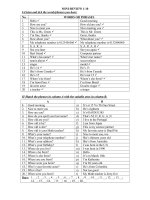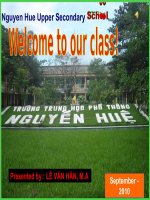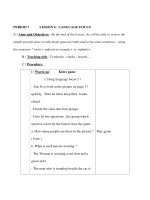- Trang chủ >>
- Nông - Lâm - Ngư >>
- Thú y
Review 1. (1-2-3). Lesson 1. Language
Bạn đang xem bản rút gọn của tài liệu. Xem và tải ngay bản đầy đủ của tài liệu tại đây (119.22 KB, 6 trang )
<span class='text_page_counter'>(1)</span><div class='page_container' data-page=1>
<i><b>Period: 25</b></i>
<b>REVISION</b>
<b>I. Objectives</b>
- After the lesson, Ss will be able use the present tenses and verbs of liking + V-ing
correctly.
<i><b>1. Knowledge, Skills, Attitude: </b></i>
<i><b>a. Knowledge:</b></i>
<i><b>- Vocabulary: </b></i>
<i><b>- Grammar</b>: </i>The present simple
<i><b>b. Skills: listening, speaking, reading and writing.</b></i>
<i><b>c. Attitude: </b></i>
To teach Ss to be hard- working and keep doing their hobbies.
<i><b>2. Capacity is formed and developed for students</b></i>
- Self – learning capability
- Communicative competence
<b>II. Preparation</b>
<i><b>1. Teacher: text book, extra board, cassette tape and real objects.</b></i>
<i><b>2. Students: textbook, notebook, workbook.</b></i>
<b>III. Students’ activities</b>
<i><b>1. Warm up (5’)</b></i>
- T introduces the lesson.
<i><b>2. Knowledge formation activities (36’)</b></i>
<b>Sts’ and T’s activities</b> <b>Contents</b>
- T divides class into 3 groups and asks each
group to give the usage and form of the
present simple, future simple tense…
- Groupwork
- Each group gives the the usage and form of
each tense.
- T corrects if necessary
<b>* Grammar:</b>
<b>1. The present simple</b>
<i>- Structure:</i>
+ Positive: S + V-s/ es + ……..
+ Negative: S + do/ does + not + V + ………….
+ Questions: Do/ Does + S + V + ……….?
<i>- Adverbs:</i> always, usually, often, sometimes, rarely,
never
<i>- Phrases:every Monday/ week/ etc. each Monday/ </i>
<i>week/ etc.</i>
<i>once/ twice a week/ month/ etc.</i>
<i>three times a week/ month/ etc.</i>
<b>2. The future simple</b>
- Structure:
+ Positive: S + will + V + …………..
+ Negative: S + will not + V + ………
+ Question: Will + S + V ……?
- Using: - Express facts about the future: The new
airport will be the biggest in Europe.
- Express predictions: You’ll have a great time in Ha
Long Bay.
- Express offers or requests: We’ll help you get ready
for your holiday.
- Express decisions made now: I know! I’ll go to China
this summer.
<b>3. Love/ like/ hate and enjoy:</b>
We can use the verbs “like”, “love”, “hate” and
<b>“enjoy” to explain our </b><i>likes</i> and <i>dislikes</i>:
Ex: - I love chocolate.
- He likes classical music.
If we use a verb, it must be in the “-ing” form:
Ex:- I love listening to music.
</div>
<span class='text_page_counter'>(2)</span><div class='page_container' data-page=2>
- T asks Ss to complete these execises.
- Ss work in groups and complete them.
- T helps Ss.
- Ss write on the board.
- Other Ss corect.
- T feedbacks.
<b>* Exercise:</b>
<b>I. Find which word does not belong to each group.</b>
1. A. environment B. bank
C. community D. neighbourhood
2. A. students B. homework
C. blood D. tutors
3. A. orphan B. grandparents
C. nursing home D. elderly
4. A. rubbish B. donate
C. collect D. money
5. A. green B. trees
C. plant D. collect
<b>II. Put the verbs in brackets in the correct tense </b>
<b>form.</b>
1. My hobby is carving eggshells and now I (carve)
...nearly 100.
2. Going home from school yesterday, I (help)…….. an old
man to go across the street.
3. Last Tuesday, I (go)………. home late because there
was a traffic jam near my school.
4. Lan never (eat)………..Banh tet. She will try some
this year.
5. Linh is my close friend. We (know)……. each other
for 5 years.
<b>III.Fill in: “yet, already, just, ago, yesterday, since, </b>
<b>for, always, ever, how long”.</b>
1. ……….. have you known Peter and Charlie?
2. Anna woke up at 9 o’clock ………..
3. She hasn’t telephoned me………...
4. I have ………. wanted to travel abroad.
5. Have you ………… been to Disneyland?
<b>IV. Correct the tense in these sentences.</b>
1. I have collected coins when I was a little boy.
2. I see a real elephant when I went to Ban Don last
year.
3. We clean the beach last Sunday.
4. I didn’t see her for two weeks.
5. Do you do your homework yet?
<b>V. Use the words and phrases to form the </b>
<b>sentences.</b>
1. some/ she / bought / last weekend / interesting book.
2. I/ love / basketball / volleyball/ watching/ and.
3. teacher/ dances/ English/ gracefully/ my/ very.
4. have to/ home/ I/ stay/ at/ because/ is/ raining/ it.
5. Vietnam/ because/ beautiful/ I/ it/ is/ love/ very.
<i><b>3. Consolidation 4’</b></i>
- T asks Ss to say the way to use the present / future simple tense.
<i><b>4. Using knowledge (option)</b></i>
<i><b>5. Further practice (option)</b></i>
<b>IV. Experience:</b>
</div>
<span class='text_page_counter'>(3)</span><div class='page_container' data-page=3>
<i><b>Period: 26</b></i>
<b>TEST 45’</b>
<b>I. Objectives</b>
<i><b>1. Knowledge, Skills, Attitude: </b></i>
<i><b>a. Knowledge:</b></i>
<i><b>- Vocabulary: From Unit 1 to Unit 3</b></i>
<i><b>- Grammar: From Unit 1 to Unit 3</b></i>
<i><b>b. Skills: listening, speaking, reading and writing.</b></i>
<i><b>c. Attitude: hard, concentrated and active.</b></i>
<i><b>2. Capacity is formed and developed for students</b></i>
- Self – learning capability
<b>II. Preparation</b>
<i><b>1. Teacher: text book, extra board, cassette tape and real objects.</b></i>
<i><b>2. Students: textbook, notebook, workbook.</b></i>
<b>III. Students’ activities</b>
<b>1. Test 45’</b>
<b>A. LISTENING(2,5)</b>
I. Listen and circle the words you hear. (1,25ms)
gold green globe girl goal
cold keen clothes curl coal
<b>II. Listen and fill in the blanks. (1,25ms)</b>
<b> because (2) volunteer children feel </b>
1. I ………..because I can make a difference in our community.
2. We’ve made many new friends, and I………..much more self-confident.
3. Volunteering is special to me………..I can help others.
4. It’s special……….I can see how happy the………..are when they learn.
<b>B. LANGUAGE FOCUS (2,5m)</b>
<b>I. Choose the best answer. (1,25ms)</b>
1. They ……….the beach one week ago.
A. clean B. cleaned C. have cleaned
2. They ……… hundreds of books so far.
A. collect B. collected C. have collected
3. I ……….stamps when I was a child.
A. collect B. collected C. have collected
4. She …………..to Da Nang many times but last year she went there by train.
A. fly B. flew C. has flown
5. Have you ever seen a real lion?- No, but I ………..a real elephant last month.
A. see B. saw C. have seen
<b>II. Matching (1,25ms)</b>
<b>Answer</b> <b>A</b> <b>B</b>
1. ………… 1. donate a. trees
2. ………… 2. plant b. books
3. ………… 3. clean c. children do homework
4. ………… 4. help d. streets
5. ………… 5. recycle e. rubbish
<b>C. READING (2,5m)</b>
<b>I. Read the text and answer the questions. (1,25m)</b>
</div>
<span class='text_page_counter'>(4)</span><div class='page_container' data-page=4>
family. You could select just one or two projects a year and make them a family tradition. For instance,
your family can make and donate gift blankets for the old homeless people on holidays. Your family can
also spend only one Saturday morning a month collecting rubbish in your neighborhood.
1. How do people often feel when they do volunteer work?
………
2. How can your family benefit from doing volunteer?
………
3. Why don’t some people have time to volunteer?
………
4. How can your family help the old homeless people?
………
5. Is collecting rubbish in the neighborhood an example of volunteer work?
………
<b>II. Fill each blank with a suitable word from the box. (1,25m)</b>
challenge collection unusual occasions pleasure
David Stewart, a 15 year old boy from Hungary has an (1) ………hobby – collecting
teabags. For the last five years, he has collected more than 200 teabags. He exchanges his teabags with
others’ from all around the world to add to his (2) ………... His family, relatives and friends are
all aware of this hobby, so on special (3) ……… they will give him teabags. David says at
first it was easy but then it is a (4) ………. to be able to find new items. He stores the teabags
in a box and keeps them in a cool, dry place so that they can be well maintained. To David, this hobby
is a great source of (5) ……….. because it helps him understand more about different
cultures around the world.
<b>D. WRITING (2,5m)</b>
<b>I. Here are some sentences about hobbies. Rearrange the words to make meaningful sentences. You</b>
<b>can not change the words. (1,0m) </b>
Example: There/ library/ many/ the/ books/ are/ in/.
-> <i>There are many books in the library.</i>
1. John/ pottery/ much/ very/ likes/ making/.
-> ………..
2. My sister/ chess/ evening/ plays/ me/ with/ every/.
-> ………..
3. Will/ next/ to climb/ mountains/ more/ year/ you/ continue/?
-> ………..
4. I/ because/ improve/ can/ usefull/ health/ soccer/ I/ playing/ find/ my/.
-> ………..
<b>II. Write a passage about 50-60 words on the topic “Your hobby” (1,5ms)</b>
………
………
………
………..
………
………
………
<b>IV. Experience:</b>
………
………
………
<i><b>Period: 27</b></i>
</div>
<span class='text_page_counter'>(5)</span><div class='page_container' data-page=5>
<b>I. Objectives</b>
<i><b>1. Knowledge, Skills, Attitude: </b></i>
<i><b>a. Knowledge:</b></i>
<i><b>- Vocabulary: From Unit 1 to Unit 3</b></i>
<i><b>- Grammar: From Unit 1 to Unit 3</b></i>
<i><b>b. Skills: listening, speaking, reading and writing.</b></i>
<i><b>c. Attitude: hard, concentrated and active.</b></i>
<i><b>2. Capacity is formed and developed for students</b></i>
- Communicative competence
<b>II. Preparation</b>
<i><b>1. Teacher: text book, extra board, cassette tape and real objects.</b></i>
<i><b>2. Students: textbook, notebook, workbook.</b></i>
<b>III. Students’ activities</b>
1. Warm up (5’)
<b>Sts’ and T’s activities</b> <b>Contents</b>
- T talks some mistakes in the test. - Mistakes in the test.
<i><b>2. Knowledge formation activities (36’)</b></i>
<b>Teacher’s and Ss’ activities</b> <b>Content</b>
-T has Ss listen to the announcement again
and answer the questions.
- Ss give the answers before the class and
explain for their choice.
- T checks and corrects any mistakes if
necessary.
- Ss copy down the correct answers.
<b>D. Listening. (2,5ms)</b>
<i>0,25 mark for each correct answer.</i>
<b>I. Listen and circle the words you hear. (1,25ms)</b>
1. cold 2. green 3. clothes
4. girl 5. gold
<b>II. Listen and fill in the blanks. (1,25ms)</b>
1. volunteer 2. feel 3. because 4. children
- T has Ss do the exercise again.
- Ss give the answers before the class and
explain for their choice.
- T checks and corrects any mistakes if
necessary.
- Ss copy down the correct answers.
<b>B. LANGUAGE FOCUS (2,5m)</b>
<i>0,25 mark for each correct answer.</i>
<b>I. Choose the best answer. (1,25ms)</b>
1. B. cleaned 2. C. have collected 3. B. collected
4. C. has flown 5. B. saw
<b>II. Matching (1,25ms)</b>
1 + b 2 + a 3 + d 4 + c 5 + e
-T has Ss read the passage and do the exercise
again.
- Ss give the answers before the class and
explain for their choice.
- T checks and corrects any mistakes if
necessary.
- Ss copy down the correct answers.
<b>C. READING (2,5m)</b>
<i>0,25 mark for each correct answer.</i>
<b>I. Read the text and answer the questions. (1,25m)</b>
1. they feel satisfied and proud
2. It is a great way for families to have fun and closer.
3. because they have to work and take of their families.
4. My family can make and donate gift blankets for the
old homeless people on holidays.
5. Yes, it is.
<b>II. Fill each blank with a suitable word from the </b>
<b>box. (1,25m)</b>
1. unusual 2. collection 3. occasions
4. challenge 5. pleasure
-T has Ss read the sentences and do the
exercise again.
- Ss give the answers before the class and
explain for their choice.
- T checks and corrects any mistakes if
necessary.
- Ss copy down the correct answers.
<b>D. WRITING (2,5m)</b>
<b>I. Here are some sentences about hobbies. </b>
<b>Rearrange the words to make meaningful </b>
<b>sentences. You can not change the words. (1,0m) </b>
<i>0,25 mark for each correct answer.</i>
</div>
<span class='text_page_counter'>(6)</span><div class='page_container' data-page=6>
4. I find playing soccer usefull because I can improve
my health.
<b>II. Write a passage about 50-60 words on the topic </b>
<b>“Your hobby” (1,5ms)</b>
<i><b>Students’ answers</b></i>
<i><b>3. Consolidation 4’</b></i>
- T says the way how to use the grammar and knowledge which they studied.
<i><b>4. Using knowledge (option)</b></i>
<i><b>5. Further practice (option)</b></i>
<b>IV. Experience:</b>
………
………
………
Signature
</div>
<!--links-->









